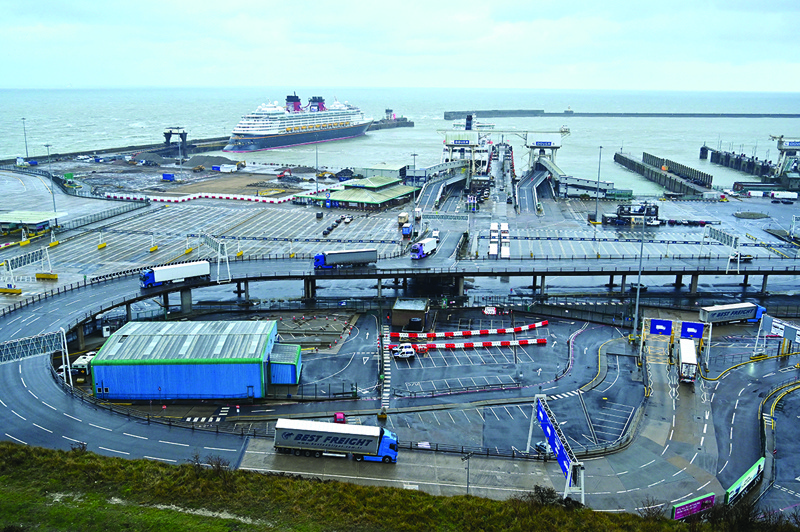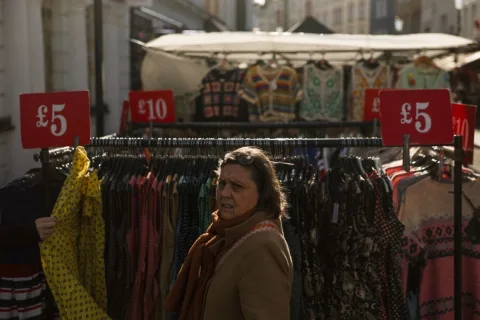 In this file photo, lorries enter the Port of Dover, southeast England following Britain's departure from the European Union. Exports of British goods to the European Union collapsed by a record 41 percent in January after the nation finalized its divorce from the bloc, official data showed on Friday.-AFP
In this file photo, lorries enter the Port of Dover, southeast England following Britain's departure from the European Union. Exports of British goods to the European Union collapsed by a record 41 percent in January after the nation finalized its divorce from the bloc, official data showed on Friday.-AFPLONDON: The financial toll of Brexit is clear for exporters like cookware maker Neil Currie: He is buried in new paperwork, has lost orders and the cost of exporting frying pans to France has doubled. Those are some of the new challenges that companies shipping goods ranging from lobster to pasta and perfume are now facing since Britain left the European Union. "Britain now looks a little bit toxic," said Neil Currie, managing director of Netherton Foundry, which makes traditional iron and copper cookware in Shropshire, England.
The post-Brexit trade deal struck between the EU and Britain is "a barrier to sell, an additional wall", Currie told AFP. Official data on Friday confirmed the worst. British exports to the EU collapsed by a record 41 percent in January, the first full month following Britain's official exit. The government, however, described the news as "inevitable" due to stockpiling last year, coronavirus lockdowns and "businesses adjusting to our new trading relationship". Data also revealed that the post-Brexit economy hit reverse overall in January, shrinking 2.9 percent from December also on COVID restrictions.
'A lot of extra money'
Brexit was finalized on January 1 after Prime Minister Boris Johnson clinched the trade deal over Christmas, but many UK exporters complain of chronic delays and hurdles to previously seamless continental trade. Currie has lost orders from customers abroad-and at one point faced uncertainty with German firms over contracts worth a combined £100,000 ($140,000, 117,000 euros).
UK companies have in particular been hit by extra paperwork, adding substantially to their costs and delaying the movement of goods. "It's a lot of extra money," Currie said. "If you're a big multinational you are going to find a way, but we've got 12 people, we don't have somebody who sits there all day working out export administration."
Exporting a £50 frying pan to France just a few months ago would have seen Netherton Foundry add around £8 in distribution costs. "Now, it's quite a lot more-it's £16 and possibly £20," noted Currie. And while pre-Brexit he could send an item to Brussels from his central England base faster than to Scotland or Northern Ireland, that is no longer the case.
Moving abroad?
A similar situation is found at fresh pasta-maker La Tua Pasta. Faced with extra costs, managing director Nicolas Hanson said his London-based operation is looking into opening a site in Europe. "But at the moment it is difficult with COVID," he said. He estimates the cost of Brexit to his company this year will be between £50,000 and £70,000. Faced with the administrative shake-up, other small British companies have simply suspended exports to the EU. For some, like lobster exporter Baron Shellfish, trading has ceased.
While the British government assures businesses that normality is resuming, manufacturing lobby group Make UK has claimed that more than one-third of its members have lost sales since the start of the year owing to Brexit. "I am going to increase my prices in France but I am not going to be able to recoup all the costs and will have to absorb half of them," said Hanson.
As for Netherton Foundry, Currie is looking into warehousing products in an EU country-and is eyeing possible sites in Belgium, France, Germany and the Netherlands. Prime Minister Boris Johnson faced a snub from one regional leader and criticism from another as he visited Northern Ireland, with tensions growing over its post-Brexit status.
The province's first minister Arlene Foster confronted Johnson with a call to undo "intolerable" new special trading arrangements in place since January, when the UK left the EU single market and customs union. Then her deputy Michelle O'Neill, from Irish republican party Sinn Fein, refused to join the welcoming delegation, citing Johnson's "reckless and partisan" Brexit strategy.
The UK officially left the European Union last year, and as part of the divorce in December agreed to a so-called Northern Ireland protocol imposing unique trading terms on the region. The arrangements aim to preserve the fragile peace in the territory of around two million people by preventing a hard border with EU member Ireland, a flashpoint in three decades of sectarian conflict which ended in 1998. - AFP










